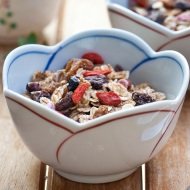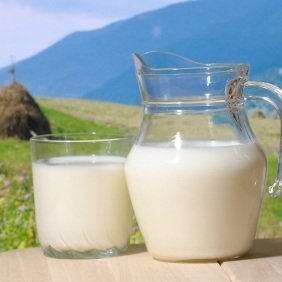Dietary Fats: Good and Bad Fats
What are the best dietary fats? Recommended daily intake of fat, is a low fat diet plan healthy? How to cut down on unhealthy fat?
There are 9 calories in 1 g of fat, which in comparison to the calories in 1 g of protein (4 kcal/g) or carbohydrates (4 kcal/g), is more than double the calories. When eating foods high in fat, it is easy to consume too many calories which can cause weight gain. However, not all fats are bad. Fats are a very important part of every diet and essential for normal body function.
Let`s see what we need dietary fats for:
- Fat supplies our body with nutrients such as fat soluble vitamins A, D, E and K and essential fatty acids, which can only be obtained from the diet to support a healthy heart and immune system.
- People in cold climates need more dietary fats than others, as a diet high in fat is superior to a carbohydrate diet for supplying internal heat.
- Dietary fats add flavour to the food and keep us full for longer, as fat digests slower than other foods.
- Fat enhances fluid metabolism.
- Fat is stored underneath the skin as a fuel reserve.
- Every cell in our body requires essential fatty acids for construction and maintenance.
- Dietary fats produce body fat needed to insulate and keep us warm and to protect and hold our internal organs in place.
When fat is solid at room temperature it’s called saturated, if liquid – unsaturated. We need both saturated and unsaturated fats in our diet and should avoid trans fats.
Good Fats vs Bad Fats
Monounsaturated and polyunsaturated fats are considered to be heart healthy fats or “good” dietary fats.
Monounsaturated fats or monounsaturated fatty acid (MUFA) are the good dietary fats. When eaten in moderation and instead of saturated and trans fats they are beneficial to our health - they lower bad cholesterol LDL (low-density lipoprotein) in our blood and reduce the risk of stroke and heart disease. Monounsaturated fat is an excellent source of an oxidant vitamin E, which we need more of in our diet, and supplies essential nutrients for growth and repairs our body cells. MUFAs help in weight loss and are a focal point in the Mediterranean diet plan.
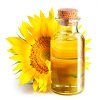
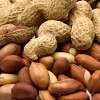
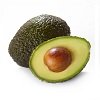
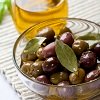
Food high in monounsaturated fat: nuts, avocado and some oils such as vegetable, canola, high oleic safflower oil, olive and sunflower oil.
Polyunsaturated fats or polyunsaturated fatty acid (PUFA), also lower total cholesterol and LDL cholesterol when consumed sparingly and as a healthy alternative to saturated and trans fats. Polyunsaturated fat can be broken down into two types: omega-3 and omega-6 fatty acids. Omega 3, and 6 are essential fats that our body cannot produce itself and we must obtain them from food we eat. They play an important role in our body development and normal brain function. Omega-3 fatty acids have been shown to protect people from sudden cardiac death. Omega-6 fatty acids lower the risk of a heart attack, but a high proportion of omega-6 to omega-3 (ratio in excess of 10 to 1) may increase the probability of a number of diseases. The best ratio is believed to be 4 to 1 or lower.
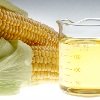
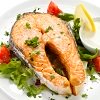
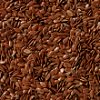
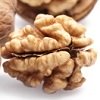
Sources of omega 6 oils: corn oil, soybean oil, safflower oil. Foods high in omega 3 are soybean oil, canola oil, flaxseed, walnuts, fish such as trout, herring and salmon, mackerel and seafood.
Saturated and trans fats are “bad” dietary fats.
Saturated fats are generally found in animal products such as cheese, butter, eggs, meats, and if regularly consumed can raise cholesterol levels in our blood. Cholesterol can eventually block up the arteries and cause heart failure. Bear in mind that food high in saturated fat also can be high in cholesterol, which can make your cholesterol levels soar.
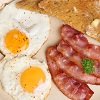
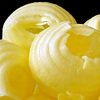
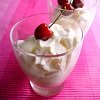
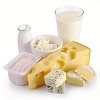
Foods high in saturated fat: beef fat, pork fat and fatty meat; dairy products such as cream, cheese, butter and ghee; chocolate, some baked and fried foods. Coconut oil, palm oil, palm kernel oil, cottonseed oil also contain saturated fat, but not cholesterol.
Trans fat is any oil that is damaged by heat, light or air in your own home, a restaurant or where it was produced. Trans-fats are toxic and should be avoided. Trans fats in partially hydrogenated oil is the most harmful. The National Academy of Science advises that there are no safe levels of trans fat consumption. Trans fats elevate your bad cholesterol levels and lower your good cholesterol levels. Trans fats increase the risk of developing type 2 diabetes, stroke and heart disease. Look out for trans fats on the nutrition labels of packaged foods and learn how to avoid unhealthy fat.
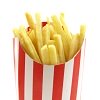
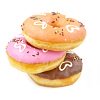
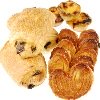

Trans fat foods: French fries, pastries and other baked goods, biscuits, doughnuts, pizza, cookies, crackers, vegetable shortenings and some margarines.
Recommended Daily Fat Intake
Many health problems are related to excessive and poor quality fat intake. Too much fat in your diet can promote cancer, obesity, gall bladder and liver disorder, heart disease, etc. The American Heart Association strongly advises the following guidelines for dietary fats intake:
- Your total fat intake per day should be limited to 25-35% of your total daily calorie intake.
- Saturated fat should be no more than 7% of your total calories each day.
- Trans fat intake must be limited to 1% of total daily calories.
- The rest of the fat should come from monounsaturated and polyunsaturated fat sources such as vegetable oils, fish, nuts and seeds.
- For most people, the cholesterol intake should be limited to less than 300 mg per day. If you have coronary heart disease or high LDL cholesterol levels of 100 mg/dL or greater, your cholesterol intake should be limited to 200 milligrams a day.
If your daily calorie needs are 2000 calories, your total recommended fat intake each day should be 55 – 77 grams with most dietary fats from monounsaturated and polyunsaturated sources such as fish, vegetable oils, nuts and seeds; consumption of saturated and trans fat should be limited to less than 16 grams and 2 grams accordingly.
Ways to Cut Bad Fat
- Use only unrefined oils and fats.
- Use only oils processed at low temperature and do not heat them above their safe point, which is several hundred degrees lower than their smoke point.
- Stay away from unhealthy fats and oils such as butter substitutes, corn oil, canola oil, cottonseed oil, fractionated palm oil, mustard oil, palm kernel oil, rice bran oil, soy oil, tea seed oil, hydrogenated fats, interesterified fat, and margarine.
- Read the label and avoid all foods with trans fats, trans fats are labelled as “hydrogenated oil”.
- Buy lean cuts of meat and low fat minces, trim fat off meat before cooking. Limit consumption of full fat cheeses, milk and other dairy products, replacing them with their low fat version.
- Eat a minimum of one good source of omega 3 fatty oils every day. Fatty fish and seafood is the best source of omega 3, non fish omega 3 sources include flaxseeds, walnuts, and soybeans.
- Choose grilling, poaching, steaming rather than frying foods.
- When eating out ditch deep fried, baked foods that may include trans fats such as cookies.
Oils for cold use: unrefined hemp, pumpkin, flax and walnut oil. Oils for cooking below 240°F: unrefined olive, macadamia, hazelnut, grapeseed and sesame oil.
Oils for cooking below 240°F: unrefined olive, macadamia, hazelnut, grapeseed and sesame oil.
For cooking at temperatures above 240°F use saturated fats such as butter, lard, tallow, schmaltz, ghee, unrefined palm and coconut oil. The benefits of saturated fats (for high temperature cooking) are that they are more stable than unsaturated vegetable oils and the only fats that can healthfully be used at temperatures between 240 and 375°F.
Are Low Fat Diet Foods Healthy?
Scientific research has found that low fat diets are not healthier than moderate or high fat diets and for some people even worse, as low fat diets tend to be high in refined carbohydrates such as white rice, potatoes, white bread, sugar drinks, etc., which are quickly digested and when eaten often and in large quantities, these carbs cause sugar misbalance and over time, increases the risk of diabetes, obesity, heart disease and hypertension. A low fat diet influences people to stop eating not only bad fat, but also dietary fats that are good for your heart. For many people low fat diets are not filling, and they are hungry again shortly after a meal. Usually processed foods which are labelled “fat free” or “low fat” are often higher in sugar, salt or starch than their full fat version, to compensate for the taste and texture which was removed together with the fat. So the fat free foods are not necessarily a healthier choice. If we take low fat and fat free salad dressing as an example, they are always higher in salt and sugar than full fat dressing. Most fruits, vegetables, dried beans and whole grains in their natural state contain little or no fat, are free from additives and certainly, they are healthy choice foods.
Will I Lose Weight on a Low Fat Diet?
Of course! As you can lose weight on any diet! Study has proven that people on moderate and high fat diets lost as much weight and in some cases even more than people who followed a low fat diet. Also low fat dieters were struggling to stick to the diet long term and keep their weight off as a result. Controlling your calorie intake is vital to ensure you lose weight. The most important factor is to find a low calorie healthy fat, healthy carb diet plan that you can follow, - the diet plan which is good for your long-lasting health.
Will Eating Fat Make Me Fat?
No, it is a delusion that eating foods high in fat makes you fat. If you eat or drink more calories than you need from any source, whether it is fat, protein, carbohydrates or alcohol, it will lead to weight gain.
You Might Also Like:
Want To Learn More?
Like This Page?
|
Share This Page:
|
Search Our Site:

Free E-Book:
We Recommend:
Looking to get your body into great shape? Get the very best results for your efforts and money! Save your valuable time from surfing the internet. These are theBestselling Weight Loss Programs
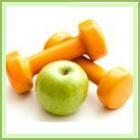
Programs that work and have thousands of satisfied customers worldwide!

 |

